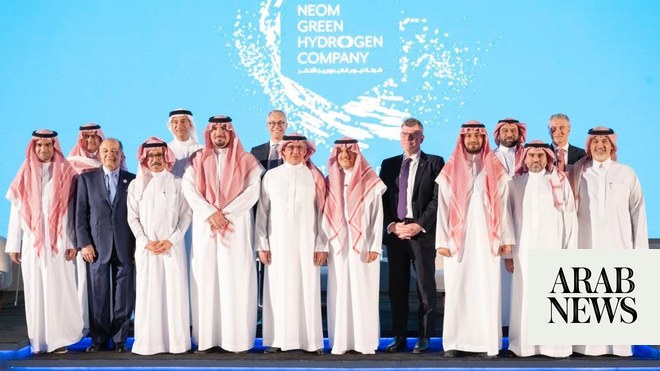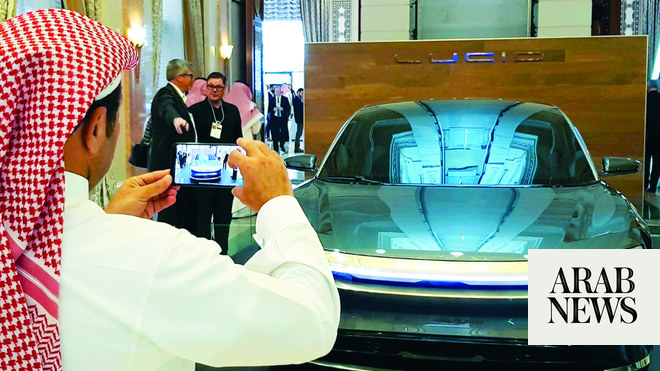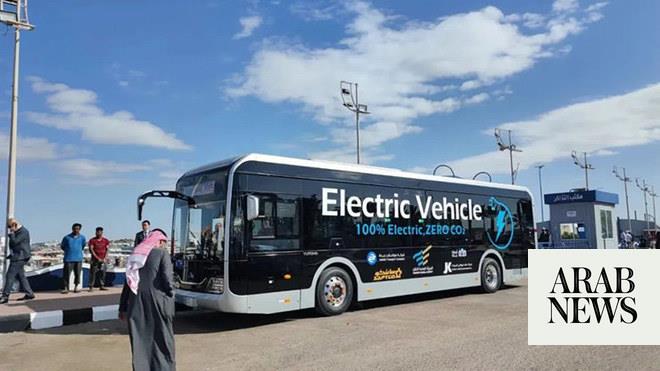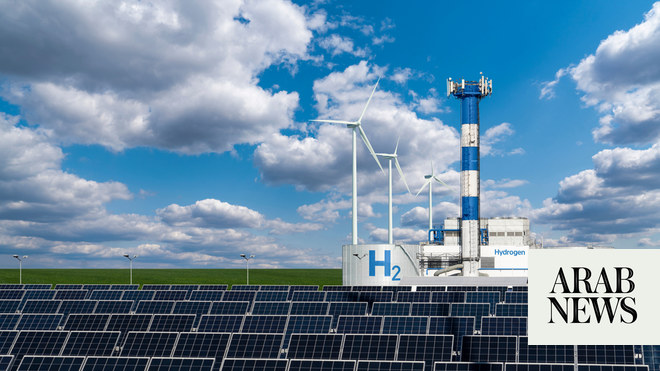
The news that US electric vehicle startup company Lucid signed a deal for the construction of a plant in Saudi Arabia to produce 150,000 electric vehicles a year has been welcomed across the Kingdom.
Saudi Arabia’s Public Investment Fund is a major Lucid stakeholder, valued at around $38.6 billion in December 2021, up from $25.8 billion in September 2021.
The Saudi manufacturing plant will potentially lead to around $3.4 billion of value over 15 years, with significant direct and indirect employment at its King Abdullah Economic City.
Lucid had already sealed a $30 million deal to lease an industrial plot in the Economic City to underscore its commitment to the Saudi venture.
The potential for the Saudi Lucid factory is significant as the Kingdom has access to over 400 million consumers in the wider Middle East where annual car sales are only 2.3 million.
Saudi Arabia’s relatively affluent population can act as the springboard for planned higher-value Lucid electric vehicles appealing to more environmentally conscious affluent consumers, as well as female drivers.
With anticipated sustained higher oil prices, due to OPEC pact production plans and geopolitical tensions, it is expected that larger government oil revenues could boost vehicle sales in the Kingdom by a compounded annual growth rate of 3.6 percent until 2023.
This will add to the Kingdom’s 11-million-unit car market, with Saudi Arabia accounting for around 40 percent of total vehicles sold in the Middle East, making Lucid’s Saudi facility a natural choice to complement local Saudi vehicle production. This output is currently limited to heavy-duty commercial vehicles by Isuzu Motors, Mercedes, Man and Volvo with a combined production capacity of about 12,000 vehicles and expected to reach 39,000 by 2022.
Isuzu has produced Renault and Volvo branded vehicles at King Abdullah Economic City since 2015, so there is already a technically skilled labor pool available for Lucid to draw on, which will also allow it to emulate established training facilities.
Lucid will benefit from current car industrial clusters, with leading Saudi business partners such as SABIC, Ma’aden’s aluminum smelter, Tasnee and Aramco to produce advanced automotive materials including carbon black and synthetic rubber for tires, carbon fiber, Nylon 66 and other car components, which few other Middle East location can provide.
The Kingdom’s National Industrial Clusters Development Program will be an invaluable partner to Lucid’s successful launch, which will increase Saudi industrial production in this specialized automotive manufacturing sector.
It will also provide opportunities for Saudi universities, like King Abdullah University of Science and Technology, to develop more advanced electric vehicle technologies to widen the country’s knowledge base.
Other bodies like the National Industrial Development Logistics Program have generated momentum by launching projects aimed at stimulating the rapid development of specific industries, such as car battery technology, a catalyst for the broader machinery industry.
The Kingdom’s Vision 2030 economic and social reform plan places great stock in its rigorous industrial and environmental conformity standards enforced by the Saudi Arabia Standards Organization.
In August 2019, Saudi Arabia took its first steps toward creating an infrastructure network for electric vehicles with the installation of Schneider Electric charging points at some SASCO filling stations. Lucid’s plans will only boost demand for such outlets across the Kingdom’s other filling stations, and even private homes, resulting in local manufacturing of charging units.
The impact on future local gasoline demand from a rapid increase in the use of electric vehicles is one of the byproducts of such a program, with current gasoline demand at around 470,000 barrels per day, slightly up but still below pre-pandemic levels of 550,000 bpd in 2019. A reduction in domestic gasoline demand will allow Saudi Arabia to export more of this refined product in the future currently at around 190,000 bpd.
However, to tempt Saudi car buyers to switch to electric vehicles, the government might have to revisit its policy of placing caps on gasoline prices to stimulate domestic fuel demand and economic activity in the face of oil price hikes.
The Lucid-Saudi PIF venture is one small step in electric vehicle rollout and market differentiation from US rival Tesla. The top range Lucid Air has the longest-range electric vehicle in history at around 520 miles, more than 100 miles beyond Tesla’s best model.
The PIF’s Lucid investment has also allowed the company to overcome initial startup problems after its first cars rolled out in late 2021, a year later than planned.
However, Lucid appears to hold one of the strongest hands among the latest electric vehicle players, hoping that their high-end Lucid Air will lure free-spending buyers away from existing cars, such as the Mercedes-Benz S-Class and BMW 7 series, popular models in the luxury Saudi car market.
The Lucid Air is not cheap, ranging from around $170,000, with more affordable models planned in 2022 at $140,000, and the cheapest with roughly a 400-mile range at $78,000.
The key is for Lucid to continue capturing electric vehicle opportunities given its battery technology leadership, which was a major factor in PIF’s investment in the company, with growth in the global electric vehicle market reaching 4.1 million units in 2021, having an expected compound annual growth of 26.8 percent and hitting 34.8 million units by 2030.
Saudi-produced electric vehicles will create challenges and opportunities for existing Saudi car import dealers, with the Lucid Saudi plant forcing them to re-assess their customers and their strategies. The electric vehicle landscape will become more competitive, as stricter carbon controls in Saudi Arabia will favor green vehicles, as the Kingdom aims to hit net zero emissions by 2060.
The Lucid announcement has set itself an ambitious objective to spark a green car revolution, and the Saudi experience could assist Lucid to launch a Saudi-specific model that could lead to a larger Gulf export market.
• Dr. Mohamed Ramady is a former senior banker and professor of finance and economics, King Fahd University of Petroleum and Minerals, Dhahran.
Disclaimer: Views expressed by writers in this section are their own and do not necessarily reflect Arab News" point-of-view












